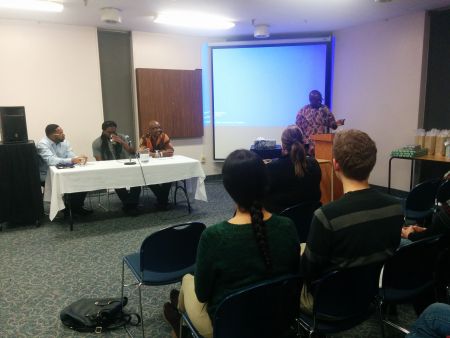“This year we are celebrating our men,” said Oluronke Taiwon at the event resistance and change: narratives of black men, held at Dalhousie University yesterday. Taiwon, fondly known as Miss T, is the black student advisor for Dalhousie University.
In a touching and emotional panel discussion held last night at the Dalhousie Student Union Building young African-Canadian men discussed their lives, the challenges they faced and the people they have become because of it.
To a very responsive crowd, speakers Rev. Dr. Lennett Anderson, Sobaz Benjamin and Dr. George Mbamalu gave insight into their lives that showed what living in Nova Scotia was really like, then and now.
Rev. Dr. Anderson gave a moving speech about his life growing up in Hammonds Plains. He quoted a line from Lift every voice and sing, sometimes referred to as the black national anthem:
"Sing a song full of the faith that the dark past has taught us,
Sing a song full of the hope that the present has brought us"
He said these lines particularly held a deep philosophy, one that resonated with every black man, that it was crucial to honour the past but equally important to celebrate the future. "I am not a victim, but a victor," he said.
“Don’t forget where you are from,” his grandmother told him while driving through Africville.
An emotional moment came when he pointed to his teacher in the crowd who had taught him black literature. “I was surprised to be in a white man’s class learning about black literature,” he said as he thanked his teacher for allowing him to learn more than ever before about himself and his rich heritage in that single semester.
Sobaz Benjamin shared a clip from his film Race is just a four letter word. From an early age he realized how people focus on skin colour.
This is an identity that emerged largely from reactionary circumstances. “We have forgotten that we are fighting for our humanity. The right to be human, not the right to be black,” is the message the video conveys.
Benjamin spoke of the challenges of raising a family, even at this day and age, and of making your kids understand what it means to be 'black'.
He recalled his meeting with film director Oliver Stone in Toronto at a book signing. Stone had talked about his issues with mental health and drug use. Benjamin went up to him and had said, “What would you say to somebody like myself who is trying to contend with similar sort of emotional trauma?” Stone didn’t say anything but wrote down the words “Transcend” in his copy of the book.
For Benjamin that was a word from above and summed up what he has been trying to do.
Now he is a filmmaker and artist who has used social media to influence the younger generation about these important issues.
The last speaker, Dr. George Mbamalu spoke of his first experience with racism in Canada after he moved from Nigeria.
Hailing from a country where all the people are of the same colour, Mbamalu never really thought of race as an issue. He simply had never experienced discrimination before.
But that quickly changed.
While looking for a place to live, when he called to check in about a local listing, one of the questions he was asked was “are you white?”
“It was a strange question. I said no, I am from Africa, so of course I am black.”
Well, “his type of people” wouldn’t like living there, the prospective landlady told him.
“It never occurred to me that she denied me the room because of my colour,” he said.



